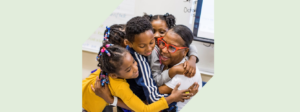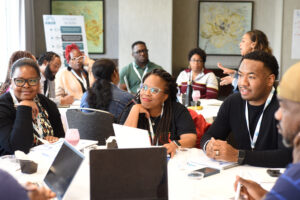Last year, the Philadelphia School Partnership, the Philadelphia Great Schools Compact and TNTP partnered to create PhillyPLUS (Pathway to Leadership in Urban Schools), the city’s first and only local alternative route to school leadership certification. Unlike traditional certification programs, PhillyPLUS Residents are immersed in an intensive summer pre-service training that prepares them for the realities of school leadership. When the school year begins, they dive into full-time instructional leadership roles, while continuing to learn under the mentorship of experienced principals.
TNTP recently spoke with PhillyPLUS Resident Jessica Ramos about her road to school leadership.
What drew you to school leadership? Is it what you thought it would be like?
 After three years as a classroom teacher, I realized that many of the problems that affected my students were outside of my control. They were things that my administrator could change, but wasn’t addressing. It was frustrating as a teacher to see such a mismanagement of resources— human resources and physical resources: scheduling to maximize every minute of the school day, for example, or strategically grouping students based on data. Some of these changes are quick fixes, but if the administrators don’t have that knowledge base, they won’t happen. I wanted to put myself in a position to make those decisions.
After three years as a classroom teacher, I realized that many of the problems that affected my students were outside of my control. They were things that my administrator could change, but wasn’t addressing. It was frustrating as a teacher to see such a mismanagement of resources— human resources and physical resources: scheduling to maximize every minute of the school day, for example, or strategically grouping students based on data. Some of these changes are quick fixes, but if the administrators don’t have that knowledge base, they won’t happen. I wanted to put myself in a position to make those decisions.
What brought you to PhillyPLUS?
I originally earned my principal certification through a traditional route, but a staggering number of people in this district have their administrator’s certificates, and it doesn’t really mean anything. What matters is experience. Once I began to interview, I was up against people with experience and connections.
PhillyPLUS pulled me in because it seemed like a real pathway to a leadership position. It was backed by the Philadelphia School Partnership, by the district, by TNTP—it even had support from the union. Everyone was with the program, and to me it was a great opportunity to get my foot in the door.
Having experienced a traditional certification program and PhillyPLUS, what do you see as the biggest strengths and challenges of earning your certification by way of a residency?
What stands out as the strength is the coaching aspect. In a traditional program, you’re not really in the role; you don’t really get that experience. In PhillyPLUS, you’re in that role, getting coached—rather than told—how to do an observation. Having someone right there with you in the moment is paramount.
Traditional programs are longer, and you get more research and theory that way, but not everyone puts those graduate school theories into practice. With PhillyPLUS, the six week intensive preparation is jam-packed—nine hour days full of things that you actually need, with tunnel vision on increased student output. We still focused on management and organizational leadership, but the root of every activity and every assignment was: “Is what I’m doing right now going to get me increased student outcomes?”
The hardest thing to pick up, which is the most important part of the job, is the observation feedback cycle. If you’re not visiting with teachers every week and debriefing with them every week, how are you supposed to master those skills? That’s not what the traditional program teaches. Traditional programs are about management and compliance, but in most programs, being an instructional leader is not the focus. The biggest thing you get from PhillyPLUS is how to be an instructional leader—how to find the balance in your day to allow 75 percent of your time to be focused on instruction, based on data.
Tell me about your placement school.
I’m placed at Stearne Elementary School, which is a K-7 in Frankford with 468 students. As a Title I school, 99 percent of our students qualify for free and reduced price lunch. It’s a very transient population, and we have a lot of mental health issues in our community. As a “Principal Resident,” I work as an assistant principal, managing eight teachers. The grade 3-4 team and the grade 6-7 team are under my management for observation and feedback, which means I’m in their classes one to three times each week, doing 15 minute observations, plus outcome-oriented debriefs. Each teacher has different needs, but each week, I try to identify a small, actionable step they can take to get a small win.
What is it like to lead a team of teachers?
The best part is when I can get a teacher to implement something, and it works for them and addresses a problem they were having, and they see that success and have that ah-ha moment. But it’s not always easy.
One difficult conversation is having to tell a teacher that he or she isn’t actually getting better at something. It becomes personal. I understand why. These are your kids. It’s your teaching. You want to do well. So when someone tells you that you’re not, it can get a little upsetting. The way I solve that is to go back to the data and ask what it’s telling us. You need to focus on student outputs.
Most times we’ve been on the same page—I have really great teachers, and the ones who are struggling know what’s wrong. When you’re a teacher, you want kids to learn. I feel the same way if I can get a teacher to learn a new strategy. If I can get a teacher to do that, I’ve reached 30 students. If I manage eight teachers, I can reach 240 students.
What would you want the rest of the country to know about your school community?
I’d want them to know that these kids deserve great leaders, too. It’s a tough neighborhood. It’s a tough city. But none of that should stop the students from receiving quality leadership in school. Many times, tough neighborhoods are where there’s the most need, and there’s definitely a lot of need in Philadelphia. It’s now or never. That’s what I want people to know. This window of opportunity is open for the taking right now. Now is the time for change.







